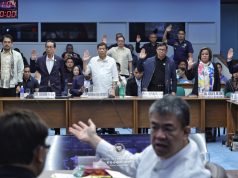MANILA, Philippines — The National Union of Journalists of the Philippines slammed the Philippine National Police for what it called “Gestapo-like” background checks by intelligence agents on new beat reporters that have included visits to their homes, communities and even offices.
PNP chief Ronald dela Rosa had initially denied the background checks but Chief Superintendent John Bulalacao, the organization’s spokesman, later admitted that the Directorate for Intelligence had been tasked to vet the reporters but had since been ordered to stop following complaints about their methods.
At least five journalists newly assigned to cover the PNP had been subjected to the background checks.
Despite this, Bulalacao said the background checks were necessary because “we have no other way to verify” the identities of the new reporters.
But while welcoming Bulalacao’s assurance that “they have put a stop to the heavy-handed vetting,” the NUJP said “the intelligence officers’ actions — tracking (the reporters), approaching or phoning them but refusing to identify themselves, visiting their homes and neighborhoods to ask about them — not only sow fear but border on the, if they are not actually, criminal.”
It also noted that “Bulalacao himself admits, a simple phone call or letter to the editors or managements of news outfits — who, after all, any organization that purports to be in the business of state security should know — should be enough to establish reporters’ bonafides.”
“Surely, one does not need police spies to handle this routine task? Unless, of course, there is a more sinister explanation for this?” it asked.
“The media deserve a more forthright accounting of how and why this fiasco ever came to be, plus an unequivocal pledge to never, ever again resort to such underhanded tactics against journalists,” it added, noting that the same tactics used on the journalists have also been used against activists and dissenters.
“Our right to privacy, communication and free movement are violated,” the NUJP said. “We demand not only an apology but full disclosure of data collected about us.”










